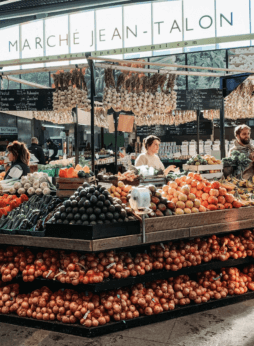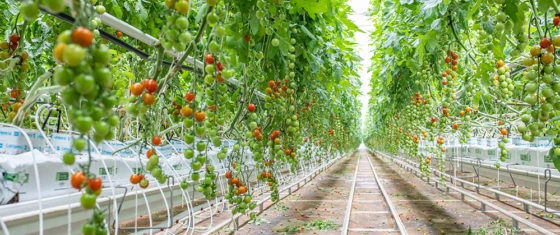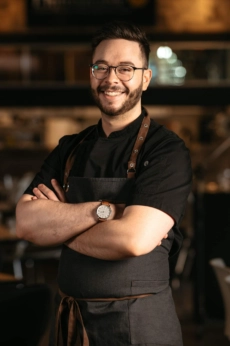If Montreal Can Feed Itself Year-Round, More Cities Can
Montreal is the world capital of urban agriculture, proving that winter weather is no reason to stop eating locally.
If Montreal Can Feed Itself Year-Round, More Cities Can
Montreal is the world capital of urban agriculture, proving that winter weather is no reason to stop eating locally.

Montreal in the fall. Photo by JF Savaria - Tourisme Montréal
It’s (relatively) easy to eat local in California, where pomegranates, apricots, cherries, persimmons, figs, citrus, avocados and apple trees literally grow on city streets and yards across the state. But in Montreal, Quebec, roughly 4,500 kilometers (2,800 miles) northeast of Los Angeles, it’s more challenging. Montreal is Canada’s second-largest city behind Toronto, with two million people, and despite its cold, rainy weather, has been dubbed the world capital of urban agriculture, according to a study comparing 10 top cities renowned for their farming.
A recent visit to the northern city of Montreal in February, when temperatures hovered around 10 degrees Fahrenheit, found restaurants and bars that still managed to serve locally grown and produced food and beverages. It drove home the point that, if they can make it work here—we can do it anywhere.

A long history
Decades before cities began actively encouraging the growing and consumption of local food, Montreal was on it. In 1936, Montreal launched the first community garden initiative, alongside the Relief Gardens, and later, the Victory Gardens that sprang up as a result of the world wars. Community gardens continued to grow in popularity over the century, with new branches and chapters flourishing in the 1970s. That’s when the concept of “guerilla gardening” became popular in the city, as groups of Portuguese and Italian immigrants began gardening in unused spaces around the city. In 1973, the Victoria Community Garden was founded by the Jewish General Hospital and the Golden Age Foundation, which aimed to create a gardening space for residents over age 55. It’s now the second-largest garden on the island.
Learn More
On the Ground With Grocery Stores Redefining How Local Food is Produced
Today, growing and consuming food feels like a cultural imperative.
“We have always valued culture and the arts, and to us, food and wine is part of that,” says Julie Martel, a longtime advocate for local produce and a project manager at the annual food-centric festival Montreal en Lumiere. “As we have all become increasingly aware of the impact of consuming food that is grown far away, Montreal’s institutions and its regular people have become more invested in supporting the local food movement.”
Today, there are 57 urban farming companies in Montreal, including the first urban rooftop greenhouse and the world’s largest urban farming project, Lufa Farms, at 300,000 square feet.

A culture of support
A proliferation of locally grown food won’t make an impact without a hungry and supportive culture. In Montreal specifically, and Quebec more broadly, that culture is specifically and purposefully fostered.
In 2020, Quebec Agriculture Minister André Lamontagne and Energy and Natural Resources Minister Jonatan Julien earmarked $100 million to double the size of the province’s greenhouse operations by 2025. Already, the province is 50 percent self-sufficient, providing its citizens with locally grown produce year round, with the goal of reaching 80-percent sufficiency.
Take Action
How to Be a Food Policy Advocate in Your Community
In Montreal, the government-funded convention center—the Palais des congrés de Montreal—is carbon neutral and has invested in several innovative food and ecological initiatives. The Urban Agriculture Lab, which has Canada’s first urban rooftop vineyard, extensive rooftop gardens and pollinating beehives, is housed there.
But perhaps more importantly, the citizens, event planners and chefs of Montreal actively support these institutions.
“Did you know that spinach grown in the winter is sweeter?” asks Martel. “It’s because it is struggling, and that process releases a chemical that makes it taste sweeter. You discover that, and so much more, as a food lover in Montreal as we all get more creative growing and eating local food year-round.”
Martel treats her robust CSA—which grows its own produce and brings in dairy, poultry and meat from nearby farms in Quebec—like many of us do our grocery store, shopping online and ordering for the week. But she also uses her position of power to ensure that Montreal en Lumiere, a festival that draws in 500,000 visitors and includes events with 52 restaurants in the city, is hyper-local focused.
“We bring in Michelin-starred chefs and iconic winemakers from across the world to create meals and pairings for the event,” says Martel. “But they are all using locally produced ingredients. When the festival began 25 years ago, it was all about Italian truffles and lemons. Now it’s about Montreal-raised fish, locally grown produce.”
Indeed, there are several now-iconic Montreal food and drinks companies that are regionally beloved but largely unknown outside of the city, simply because most of their goods are consumed by local gourmands.
Lufa Farms, the world’s first commercial rooftop greenhouse, was founded in 2009, employs more than 600 people and grows 50+ types of produce (including 10 varieties of tomatoes and three varieties of eggplant) across 300,000 square feet on four rooftops. That bounty totals 25,000 pounds a week and goes to 20,000 customers who are able to order customized food baskets. Lufa offers more than 400 pick-up points around the city, and the farm also delivers straight to customers’ doors.
Several restaurants in Montreal proudly showcase their connection to Lufa Farms and another new local-famous innovator: Opercule.
Founded in 2017, Opercule farms arctic char sustainably, consuming, it says, 100 to 200 times less water than classic open-circuit fish farms. (It is also powered by hydropower, which is ample in Quebec and much cleaner than alternatives such as coal). The fish are raised without antibiotics or hormones and delivered to the dozens of grocery stores and restaurants with which it works, just hours after being harvested via electric vehicles. Opercule produces around 25 tons of fish per year and harvests fish only once an order is placed.
Other, less obvious locally produced food and drinks businesses are also thriving. Take Distillerie de Montreal.
Founded by fifth-generation distiller Lilian Wolfelsberger and lawyer and entrepreneur Stéphane Dion, the Distillerie produces about 300,000 bottles across more than two dozen different products, many of them using all local ingredients, says production manager Alexandre Arpin. “We buy mash from our local brewery that sources grain locally, and in a few years, we’ll be using our own grains, which we plan to source from our friends nearby.”
The vast majority of the production is purchased locally, although it does have a cult following in certain pockets of Europe.
Distillerie also creates several spirits and liqueurs from locally farmed or foraged fruit, including La Pomme Blanche Marie-Jo (made with locally grown apples) and Sureau Elderberry (made with locally harvested elderflowers and berries).
“We’ve ended up with some of our more interesting products because of things our forager Guy has brought us,” says Arpin. “I have at least 74 plants and mushrooms in some stage of distillation from things he’s brought us.”

Looking ahead
Montreal rides its fame for bagels, poutine and smoked meat hard. But it is also increasingly seeking to honor the traditions and cuisines from the 120 ethnicities that live and thrive there, especially that of its First Nations people.
In addition to supporting museum collections and festivals highlighting First Peoples’ culture, a First Nations Garden has been opened in the city’s Botanical Garden, and the city’s large-scale festivals are working to bring in and highlight the work of First Nations producer chefs.
“We have so much to learn from the history and culture of the Indigenous people,” says Martel. “We decided to spotlight Indigenous cuisine at the festival this year, because we recognize how much Indigenous people have to offer in terms of knowledge of the edible plants and spices we still have to discover all around us.”
Maxime Lizotte, an Indigenous chef who worked at some of the country’s top kitchens, agrees.
“During the pandemic, I decided it was time to focus on my Indigenous roots,” he explains. “I want to not only honor the traditions and lands of my ancestors of the Wolastoqiyik Wahsipekuk First Nation but also merge them with the cuisines that influenced me and made me fall in love with cooking and food.”
Much of the food that his ancestors cooked and ate was for survival, he explains.
“The conditions were harsh,” he says. “A lot of our produce and meat was smoked or dried or both. It was an excellent way to preserve the food and sustain life, but maybe it’s not the way we want to eat today.”
So, instead of serving up dried berries and simply smoked seal meat, he combines the best of both worlds.
“I use Indigenous ingredients like seal and wild plants but also pork raised on my ancestral land,” he says. “To me, that’s more logical than serving deer flown in from New Zealand.”
Montreal’s spirit of using what you have on hand but prepared with inspiration from a wide swath of histories and cultures feels extraordinarily 22nd century.
Hungry to find your own local, progressive, home-grown flavor? Check out the USDA’s CSA finder and LocalHarvest. Then write your local political representative and tell them to take a few pages out of our northern neighbor’s playbook and start funding local farming institutions.
Follow us
This work is licensed under a Creative Commons Attribution-NoDerivatives 4.0 International License.
Want to republish a Modern Farmer story?
We are happy for Modern Farmer stories to be shared, and encourage you to republish our articles for your audience. When doing so, we ask that you follow these guidelines:
Please credit us and our writers
For the author byline, please use “Author Name, Modern Farmer.” At the top of our stories, if on the web, please include this text and link: “This story was originally published by Modern Farmer.”
Please make sure to include a link back to either our home page or the article URL.
At the bottom of the story, please include the following text:
“Modern Farmer is a nonprofit initiative dedicated to raising awareness and catalyzing action at the intersection of food, agriculture, and society. Read more at <link>Modern Farmer</link>.”
Use our widget
We’d like to be able to track our stories, so we ask that if you republish our content, you do so using our widget (located on the left hand side of the article). The HTML code has a built-in tracker that tells us the data and domain where the story was published, as well as view counts.
Check the image requirements
It’s your responsibility to confirm you're licensed to republish images in our articles. Some images, such as those from commercial providers, don't allow their images to be republished without permission or payment. Copyright terms are generally listed in the image caption and attribution. You are welcome to omit our images or substitute with your own. Charts and interactive graphics follow the same rules.
Don’t change too much. Or, ask us first.
Articles must be republished in their entirety. It’s okay to change references to time (“today” to “yesterday”) or location (“Iowa City, IA” to “here”). But please keep everything else the same.
If you feel strongly that a more material edit needs to be made, get in touch with us at [email protected]. We’re happy to discuss it with the original author, but we must have prior approval for changes before publication.
Special cases
Extracts. You may run the first few lines or paragraphs of the article and then say: “Read the full article at Modern Farmer” with a link back to the original article.
Quotes. You may quote authors provided you include a link back to the article URL.
Translations. These require writer approval. To inquire about translation of a Modern Farmer article, contact us at [email protected]
Signed consent / copyright release forms. These are not required, provided you are following these guidelines.
Print. Articles can be republished in print under these same rules, with the exception that you do not need to include the links.
Tag us
When sharing the story on social media, please tag us using the following: - Twitter (@ModFarm) - Facebook (@ModernFarmerMedia) - Instagram (@modfarm)
Use our content respectfully
Modern Farmer is a nonprofit and as such we share our content for free and in good faith in order to reach new audiences. Respectfully,
No selling ads against our stories. It’s okay to put our stories on pages with ads.
Don’t republish our material wholesale, or automatically; you need to select stories to be republished individually.
You have no rights to sell, license, syndicate, or otherwise represent yourself as the authorized owner of our material to any third parties. This means that you cannot actively publish or submit our work for syndication to third party platforms or apps like Apple News or Google News. We understand that publishers cannot fully control when certain third parties automatically summarize or crawl content from publishers’ own sites.
Keep in touch
We want to hear from you if you love Modern Farmer content, have a collaboration idea, or anything else to share. As a nonprofit outlet, we work in service of our community and are always open to comments, feedback, and ideas. Contact us at [email protected].by Kathleen Willcox, Modern Farmer
March 13, 2024
Modern Farmer Weekly
Solutions Hub
Innovations, ideas and inspiration. Actionable solutions for a resilient food system.
ExploreExplore other topics
Share With Us
We want to hear from Modern Farmer readers who have thoughtful commentary, actionable solutions, or helpful ideas to share.
SubmitNecessary cookies are absolutely essential for the website to function properly. This category only includes cookies that ensures basic functionalities and security features of the website. These cookies do not store any personal information.
Any cookies that may not be particularly necessary for the website to function and are used specifically to collect user personal data via analytics, ads, other embedded contents are termed as non-necessary cookies.